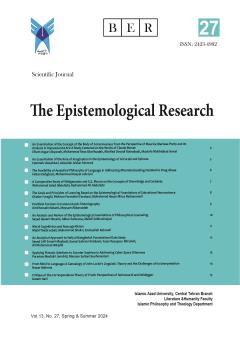moral cognitivism and noncognitivism
Subject Areas : Epistemological researchesMajid Tayebi 1 , mohammad shokry 2 , enshaallah rahmati 3
1 - دانشگاه آزاد اسلامى
2 - Tehran- Islamic Azad university- - Tehran north branch- philosophy of art
3 - Professor, Department of Philosophy, Religions and Mysticism, Faculty of Literature and Humanities, Central Tehran Branch, Islamic Azad University, Tehran, Iran
Keywords: moral Knowledge, noncognitivism, skepticism, moral propositions, moral beliefs,
Abstract :
One of the most important issues in the field of epistemology of ethics is the possibility or impossibility of obtaining moral cognition. In this article, we examine moral beliefs that are propositions; it studies the possibility of being right and wrong of the propositions derived from real affairs or expressing desires, tendencies and expressing feelings, or even they are the kind of imperatives. The humen are often capable of doing moral action; While they often don't even have the ability to express or argue about it. Although people do not speak confidently about their moral cognition, they do moral action whether it would be right or wrong. In the first part of this article, people's confidence and intuition about moral cognition and action are discussed. In the second part of this study, moral cognitivism argues that moral propositions express a kind of cognition and can be really right or wrong, but on the other hand, there are some other philosophical currents in the field of ethics that put the possibility of moral cognition under the question. And these philosophical currents that are opposite to cognitivism are known as non-cognitivism and moral skepticism. According to non-cognitivists, moral imperatives and propositions are not beliefs about real affairs and do not have the ability to be right or wrong. Although skeptics accept that humen are supposed to have moral beliefs, they believe that these beliefs are completely unjustified. In this article, the above-mentioned issues are discussed.
آبلسون، رازیل . نیلسون، کای. (1392). تاریخ فلسفه اخلاق در دانشنامۀ فلسفۀ اخلاق، ترجمۀ انشاءالله رحمتی. تهران، انتشارات سوفیا
حسینپور، علیرضا.(1385). شهودگرایی [اخلاقی]، فصلنامۀ علامه، شمارۀ دوازدهم، صفحات 128-121، زمستان 1385
دپاول، مایکل آر. (1392). معرفت شناسی اخلاق در دانشنامه فلسفه اخلاق، ترجمه انشالله رحمتی. تهران، انتشارات سوفیا
شیدان شید، حسینعلی. (1383). ارتباط عقل و اخلاق از دیدگاه هیوم، نشریۀ اندیشههای فلسفی، مؤسسه انتشارات پژوهشی آفرند، شمارۀ اول، سال اول، صفحات 136-117، زمستان 1383
مورتون، ادم. (1381). فلسفه در عمل: مدخلی بر پرسش های عمده، ترجمه فریبرز مجیدی. تهران، انتشارات مازیار
واله، حسین؛ نقوی، رضا. (1398). استدلال پرسش باز مور در فلسفه اخلاق مور و چالش پارادوکس تحلیل در آن، فصلنامۀ پژوهشهای فلسفی کلامی، شمارۀ دوم، سال بیستویکم، صفحات 73-96، تابستان 1398
کاپ، دیوید. (1392). شکاکیت اخلاقی در دانشنامه فلسفه اخلاق، ترجمه انشالله رحمتی. تهران، انتشارات سوفیا
هریسون، جاناتان. (1392). طبیعت گرایی اخلاقی در دانشنامه فلسفه اخلاق، ترجمه انشالله رحمتی. تهران، انتشارات سوفیا
Ayer, A. J. (1936). Language, Truth, and Logic London: Gollancz, 1946
Brink, D. (1989). Moral Realism and the Foundations of Ethics, Cambridge: Cambridge University Press
Harman, G. (1977). The Nature of Morality: An Introduction to Ethics. New York: Oxford University Press
Hooker, B. (1998). Moral Expertise. In Routledge Encyclopedia of Philosophy, (Vol.6, pp. 509-511). New York, NY: Routledge
Mackie, J. L. (1977). Ethics: Inventing Right and Wrong. Harmondsworth, U. K.: Penguin
Nielsen, K. (1974). "Why Should I Be Moral?" In Introductory Readings in Ethics, edited by W. K. Frankena and J. T. Granrose. Englewood Cliffs, NJ: Prentice-Hall
Wallace, R.J. (1998).


